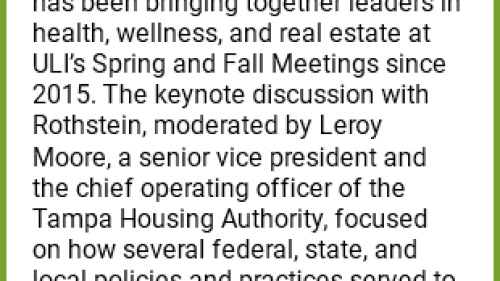The strength of the U.S. real estate market depends on a strong economy, which in turn depends on the nation’s security. For this reason, ULI invited the Honorable Robert M. Gates, former U.S. Secretary of Defense, to address the closing session of the Urban Land Institute’s 2011 Fall Meeting in Los Angeles.
Gates started out by saying that ever since the end of the Cold War, some other nations and groups have resented U.S. predominance in world affairs, and no longer saw the need to align their interests with those of the United States. In fact, he noted, many people outside the United States welcomed the perceived national humiliation of 9/11.
Since 9/11, Gates went on, the United States has become mired in a decade of war, economic crisis, and political gridlock. Has this led to a permanent shift in international geopolitics?
Many indicators point to the potential predominance of China on the world scene, Gates noted. After all, China has had an annual gross domestic product (GDP) growth rate of 10 percent since 1992, and is now the world’s second-largest economy; at this rate, it will take first place by 2016. Also, China has $3 trillion in foreign reserves, much of which is being invested in advanced military technology.
But China has underlying weaknesses that could make it the ultimate “paper tiger.” Its continued legitimacy depends on maintaining its current rapid rate of growth, which necessitates creating 20 million new jobs per year. China cannot easily expand domestic consumption, due to the population’s characteristic thriftiness. The nation’s energy demand is skyrocketing and it also is suffering from a property bubble and questionable soundness of its banks. Economic reforms have taken a human toll, rendering China’s economy unstable, unbalanced, and unsustainable.
The West faces a challenge in encouraging China to be a responsible world stakeholder, without converting that nation into an enemy, said Gates. In fact, the United States is relying on China as the world’s only hope for influencing the hard-line government of North Korea to change its provocative behaviors.
Another area of concern for the United States comes from its old enemy, Russia, which has vast natural resources and a nuclear arsenal, along with a declining population and life expectancy. Its people are nationalistic and feel humiliated, Gates noted. With Vladimir Putin ascending to the presidency—a job he may hold until 2024—the United States can expect more “arbitrary” behavior.
Finally, Gates turned his attention to the world’s tinder-box, the Middle East. The “Arab spring” could result in greater freedom, but also has other potential outcomes, including the success of Islamic parties in creating theocratic authoritarian governments, along with sectarian violence as borders created during the colonial era begin to disintegrate. Perhaps the only bright spot in the ongoing turmoil is the evident irrelevance of Al-Qaeda.
But then there is Iran, where leaders clearly see the United States’ reluctance to take a hard line against nuclear-armed states. The United States has few options, Gates pointed out. Attacking Iran could cause the people to rally behind their government, and could result in Iran’s closing the Persian Gulf to oil transport. Yet a nuclear-armed Iran also would be catastrophic, emboldening that nation’s aggression and fueling a Middle East arms race.
So what is the United States to do? The country must get its finances in order, for one thing, which will require political leadership making unpopular decisions. The United States needs to overhaul the redistricting process, Gates said, which has led to so many “safe” Congressional seats that the real electoral battles are fought in party primaries dominated by partisan extremists. We also need a consistent strategy that crosses party lines, like the one that existed during the Cold War. Compromise has become a dirty word, Gates noted, yet even the Constitution was based on a series of political compromises. We Americans are masters of our own fate, he concluded; if we fall from prominence, it will be because we failed, not because others succeeded.


